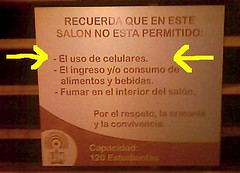¿Sabía usted que el 2007 fué el año de la solidaridad en la Universidad de la Sabana?
Muchos esfuerzos institucionales y personales se han llevado a cabo para llevar aliento y ayuda a personas que están viviendo bajo circunstancias difíciles, enmarcadas, casi siempre, en contextos de desprotección, inequidad e indiferencia.
Actuar para ayudar en aras de brindar techo, vestido, alimentación y salud es lo primero que se nos viene a la cabeza cuando hablamos de solidaridad. Sin embargo, es posible encontrar otras maneras de actuar solidariamente, desde la academia y, con ello, aportar significativamente al desarrollo de nuestro entorno. Compartir el conocimiento es una de ellas. Ahora bien, esto se puede conseguir solo, si se les facilita a los profesores los medios para sacar el conocimiento de sus escritorios y plasmarlo en recursos que puedan ser divulgados y aprovechados por todas aquellas personas con necesidades de formación relacionadas con dicho conocimiento. Es aquí cuando entran en juego los objetos de aprendizaje.
¿Que se entiende por objeto de aprendizaje?
Hay que reconocer que una indagación juiciosa acerca del tema arroja muchas definiciones y que, infortunadamente, muchas de ellas generan más ambigüedad e incertidumbre que certeza.
Reconociendo este hecho y atendiendo a la necesidad de establecer claridades conceptuales y procedimentales sobre los objetos de aprendizaje, la Universidad de La Sabana ha sido partícipe de la construcción de una definición conceptual sobre este tema, en un esfuerzo interinstitucional coordinado por el Ministerio de Educación Nacional.
Un objeto de aprendizaje (OA) se entiende como:
“Una entidad digital, autocontenible y reutilizable, con un claro propósito educativo, constituido por al menos tres componentes internos editables: contenidos, actividades de aprendizaje y elementos de contextualización. Los objetos de aprendizaje han de tener una estructura externa de información que facilite su identificación, almacenamiento y recuperación: los metadatos.”(Chiappe, Segovia, & Rincon, 2007).
Reconocido como un cierto tipo de material educativo digital, un objeto de aprendizaje puede ser ubicado en un repositorio, lo que le permitiría al mundo entero, no solo reconocer la producción académica de un profesor (aparte de sus escritos) y el enorme aporte que esto constituye de parte de la institución que lo respalda, sino que también, permite que el mundo haga uso de dichos objetos, aplicándolos a diversos contextos educativos y adaptándolos de acuerdo a sus propias necesidades de formación, cuando esto sea posible.
Los proyectos alrededor de los OAs en la Universidad de La Sabana están, en este momento siguiendo, desde la distancia, los pasos de la iniciativa “Open Courseware” del MIT demostrando que es posible aportar conocimiento abierto al mundo de manera solidaria y con ello ratificar su aporte al mejoramiento de las condiciones educativas de una nación como factor clave de su desarrollo social y económico.
Fuente:Chiappe, A., Segovia, Y., & Rincon, H. Y. (2007). Toward an instructional design model based on learning objects. Educational Technology Research and Development , 55, 671-681.
------------------
Did you know that 2007 was the year of solidarity at the Universidad de La Sabana?
Many institutional and personal efforts have been undertaken to bring aid and encouragement to people who are living under difficult circumstances, framed almost always in contexts of insecurity, inequality and indifference.
Acting to provide shelter, clothing, food and health is the first thing that comes to mind when we speak about solidarity. However, it is possible to find other ways to act in solidarity, from the academy, and thereby contribute significantly to the development of our environment. Sharing knowledge is one of them. However, this can be achieved only if it makes it easier for teachers to move content out of their desks and translate it into digital resources that can be disclosed and exploited by all people with training needs related to such knowledge.
Here comes into scene…the learning objects.
What is meant by learning object?
A proper search about this topic throws many definitions and, unfortunately, many of them generate more ambiguity to certainty.
Recognizing this fact and taking into account the need for a clearer conceptual and procedural definition of learning objects, the Universidad de La Sabana has been involved in the construction of a conceptual definition on this topic, into an inter-institutional effort coordinated by the Ministry of National Education.
A learning object (LO) is defined as:
"A digital self-contained and reusable entity, with a clear educational purpose, with at least three internal and editable components: content, learning activities and elements of context. The learning objects must have an external structure of information to facilitate their identification, storage and retrieval: the metadata. " (Chiappe, Segovia, & Rincon, 2007).
Recognized as a kind of digital educational material, a learning object can be placed into a repository, which would allow it to the entire world, not just recognize the academic output of a teacher (apart of his writings) and the enormous contribution that this is part of the educational institution that supports it, but also allows the world to make use of such objects applied to various educational contexts and adapting them according to their own training needs, whenever possible.
The projects around LO at the Universidad de La Sabana are following, from the distance, the footsteps of the MIT´s Open Courseware initiative, demonstrating that it is possible to make knowledge open to the world in solidarity and thereby ratifying their contribution to improving the educational conditions of a nation as a key factor in their social and economic development.
Source:Chiappe, A., Segovia, Y., & Rincon, H. Y. (2007). Toward an instructional design model based on learning objects. Educational Technology Research and Development , 55, 671-681.
Blog de Andrés Chiappe - Objetos de Aprendizaje - Learning Objects. "learning objects"
"learning objects" "objetos de aprendizaje"
"objetos de aprendizaje" "elearning"
"elearning" "e-learning"
"e-learning"












